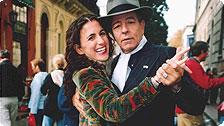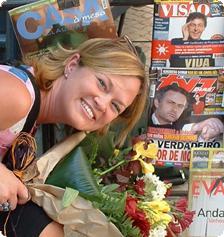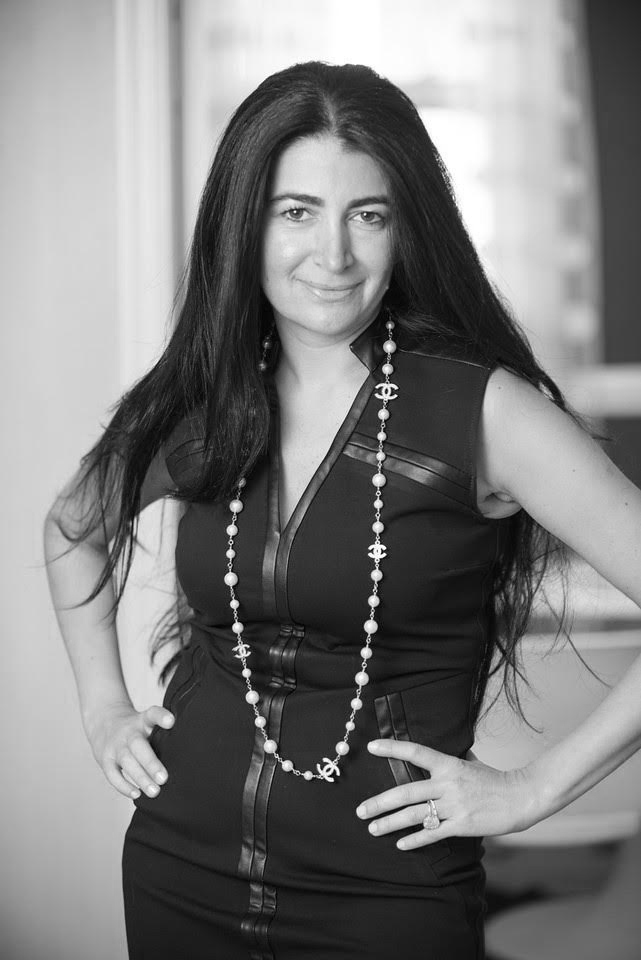Stephanie Elizondo Griest has mingled with the Russian Mafiya, polished Chinese propaganda, and belly danced with Cuban rumba queens. These adventures are the subject of her award-winning memoir: Around the Bloc: My Life in Moscow, Beijing, and Havana (Villard/Random House, 2004).
Atria/Simon & Schuster will publish her memoirs from Mexico in 2008, and Travelers’ Tales published her guidebook, 100 Places Every Woman Should Go, in spring 2007. A former Hodder Fellow at Princeton University, she has also written for The New York Times, Washington Post, Latina Magazine, and numerous Travelers’ Tales anthologies. An avid traveler, she has explored 25 countries and once spent a year driving 45,000 miles across the United States, documenting its history for a website for kids called The Odyssey.
Visit her website at www.aroundthebloc.com.
* * * *
1. What was the best decision you made in your life?
Quitting my job in order to write. Being an author was my childhood dream, but I thought you had to wait until you were old enough/smart enough/talented enough/financially secure enough to embark on such a path. Soon after turning 24, however, I started doubting that day would ever come. So I gave up my reporting gig at the Associated Press, moved back in with Mom and Dad in Corpus Christi, Texas, and began working 10 hours a day on a memoir about my travel adventures.
Four years, nine book proposals, four complete manuscript rewrites, 33 agents, 31 publishers, and countless revisions, split ends, and nervous breakdowns later, Random House published it. The first time I held, “Around the Bloc,” in my hands, I dropped to my knees and cried. Later that night, after consuming copious amounts of Soviet Champagne on Brighton Beach with a friend, I experienced perfect bliss. Though it is still a struggle, I continue making a living following my passions: traveling, writing, and activism.
2. What is your most memorable travel moment?
Living out of an ’81 Honda Hatchback named Bertha while driving cross-country making documentaries for, The Odyssey, a non-profit website for K-12 students (www.ustrek.org ). Our daily budget was $15, which meant we had to rely on the kindness of strangers for our sustenance. This inspired quite a few adventures.
Most profound was the evening my colleague and I got lost on the Navajo Reservation in Arizona half an hour before sunset. We were searching for Chilchinbito, a village so tiny it wasn’t on any map. We had been told that a family by the name of Cowboy might let us crash on their floor there—but they had neither an address nor a telephone. And so, we were relying on faith. Faith that the Cowboys would be home; faith they would share their hearth with weary travelers. Otherwise, we would be stuck in the cold desert for the night.
Finally, we spotted a small community of mobile homes and some traditional Navajo settlements constructed of logs and packed dirt. The sound of a single wooden flute drifted out of an open window. We parked beneath it. A woman peeked out the doorway and within moments of hearing our dilemma, she offered us her living room floor. There, an ancient woman sat behind a loom, weaving a saddlebag, while her son played the flute. We spent half the night trading stories. This is why I travel: to share intimacy with the people of the planet.
3. What was the worst travel experience you had?
Getting chased down a dark alley by a pack of drunk Russian men in the dead of winter in Moscow, while wearing high heels. This experience taught me two things. First, you can never learn enough of a local language. (When I screamed for help, I used the Russian verb for “Assist me!” rather than “Save me!”) And always wear shoes that you can run in.
4. What have you learned about yourself through traveling?
Mother Road changes us in profound ways. All the identities I’d spent a lifetime cultivating peeled off one by one. My vegetarianism drowned in a bowl of yak penis soup. I compromised my feminism by dating men who treated me terribly. I never felt less Chicana than I did in Mexico, where my Tex-Mex Spanish was barely intelligible to the people with whom I badly wanted to connect.
Traveling built within me a foundation that allows me to stroll the world’s passageways with confidence. It taught me the difference between being alone and being lonely, and made me ever selective of my company. I have become such a self-sustained, self-contained unit, I’m expecting to self-pollinate any day now.
5. If you could choose your ultimate travel companion, living or dead, real or imaginary, who would it be?
I’d travel back to the turn of the 20th century and join John Reed in chronicling the Mexican and Russian revolutions (which he vividly captured in “Insurgent Mexico” and “Ten Days that Shook the World”). Hopefully I’d avoid the typhus that wiped him out!
6. What moment in your life did you feel the most alive?
The night of my book launching for, “Around the Bloc.” My friends treated it as my wedding, flying out from all corners of the globe to help celebrate. More than 100 of us crammed into Bluestockings (an independent bookstore on the Lower East Side of Manhattan) for a reading, then invaded the Moroccan lounge next door and belly danced until the sun rose. I don’t think my feet ever touched the ground that night!
7. If money and time were no object, where on earth would you go?
I’d bribe my way into North Korea.
8. Who is your hero?
While driving cross-country with The Odyssey, I searched for a heroine in history: someone whose actions and philosophy I could wholly embrace. But I came to realize that even revolutionaries are only human in the end, with all our requisite flaws. Ida Tarbell made incredible strides in investigative journalism, but she was ardently anti-feminist. John F. Kennedy instilled great hope in the nation and started the Peace Corps, but look what he did to Cuba.
I’ve since concluded that if you can’t find a hero, strive to be your own. That’s easier than it sounds. The Little Rock Nine were barely sixteen years old when they integrated their all-white high school in Arkansas. Martin Luther King Jr. was just twenty-six when he kick-started the Civil Rights Movement. Dolores Huerta, the co-founder of United Farm Workers, started a revolution while single-handedly raising eleven kids!
Become the person you look up to most.
9. Name a place in the world that you know a lot about and would make a great resource for our Divas. Tell us about it.
Our own motherlands. At some point in life, return to your ancestral home—be it a specific neighborhood or an entire continent—to learn from the roots within you. I spent much of 2005 exploring Mexico, and it gave me a profoundly deeper intimacy of my people, my culture, and ultimately of myself. This transformation is actually the subject of my next memoir.
10. And finally a word from our Featured Diva, give us a stirring, Diva-worthy battle cry for women everywhere to hear!
Take to Mother Road! As I write in my new guidebook, “100 Places Every Woman Should Go,” she is one of the most formative teachers around. She will push you to your physical, spiritual, and psychological limits—then nudge you one step further. She will teach you to be self-reliant and self-sufficient, which will in turn make you self-confident. May you journey far and wide!















